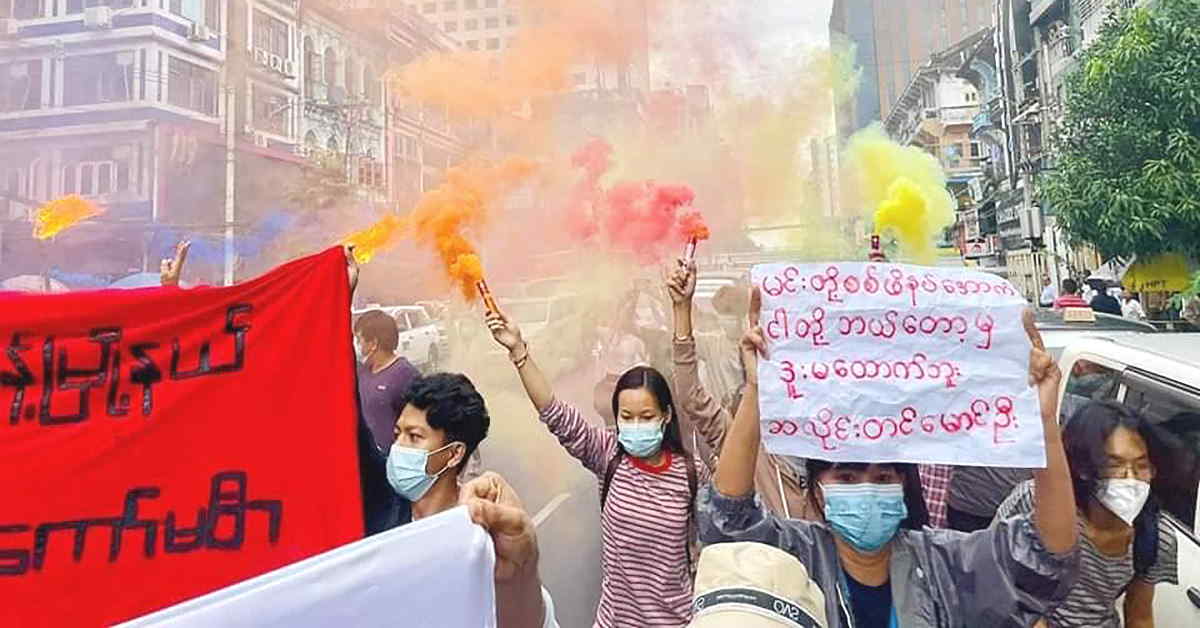Myanmar's multi-billion-dollar jade mines risk becoming a "slush fund" for military repression, Global Witness said Tuesday, urging consumers to boycott purchasing any jade and gemstones from the coup-wracked nation.
The country has been in turmoil since the military toppled the government of Aung San Suu Kyi, with more than 880 killed in a junta crackdown on dissent, according to a local monitoring group.
Myanmar is one of the world's biggest sources of jadeite and the industry is largely driven by insatiable demand for the translucent green gem from neighbouring China.
The mines in northern Kachin state are mired in secrecy, but help finance both sides of a decades-long civil war between armed ethnic groups and the military.
With the military taking control of licensing, the industry now risks "becoming a slush fund and source of patronage" for the junta as it looks to secure its grip on power, international watchdog Global Witness said in a report released Tuesday.
"The grip of the military on the jade sector is so strong that it would be nearly impossible to purchase jade without providing money to the generals and their allies," said Keel Dietz, the NGO's Myanmar Policy Advisor.
The group called for sanctions to ban the import of all jade and gemstones mined in the country and for companies and consumers to "avoid purchasing any jade and gems sourced from Myanmar".
Very little of the profits end up in state coffers, with most high-quality jade smuggled over the border into China.
Before the coup, 70 to 90 percent of all jade mined in Hpakant in Kachin state was smuggled over the border "without ever entering the formal system in Myanmar", Global Witness said.
"China, as the main driver of demand for jade, also has a key role to play in addressing its role in corruption and conflict linked to the trade."
Air Strikes
The coup has also triggered an "explosion" in fighting in Kachin state between the Kachin Independence Army (KIA), which has waged a decades-long insurgency, and the Myanmar military, Global Witness added.
In May, the military launched air strikes against the group, which later said it had downed a helicopter gunship during fierce clashes in the country's far north.
The coup has also effectively extinguished any chance of reform to the dangerous and unregulated industry started by Suu Kyi's government, Global Witness said.
Thousands of illegal workers travel to Kachin state each year to buy their way into the vast open-cast mines after diggers from state-sanctioned companies leave.
They end up exploited by mafia operations that benefit kingpins and various armed groups, analysts say.
Landslides and accidents in the over-excavated hills are common, especially during Myanmar's severe monsoon season.
Last year, one landslide claimed the lives of nearly 300 miners.
"As the people of Myanmar risk their lives to stand up to the military regime, the priority for the international community right now should be bringing an end to the coup and helping ensure a democratic and legitimate government is returned to power," Dietz said.
"A crucial part of this is cutting off the financial flows to the military through targeted sanctions on their economic interests, including the jade sector."
Suu Kyi Urges Myanmar To Stay 'United'
Meanwhile, ousted leader Aung San Suu Kyi has asked the people of Myanmar to stay "united" in the face of military rule, her lawyers said Tuesday, as she reappeared in a junta court.
The Nobel laureate, and daughter of independence hero General Aung San, has been under house arrest since a February coup that sparked huge pro-democracy protests the junta has tried to crush with deadly force.
Invisible to the outside world bar a handful of courtroom appearances, Suu Kyi, 76, has been hit with an eclectic raft of charges. She could face more than a decade in prison if convicted on all counts.
On Tuesday, she heard testimony that she flouted coronavirus restrictions during elections her National League for Democracy (NLD) party won by a landslide last year, her lawyer Min Min Soe told reporters.
"She asked the people to stay united and be consistent," she added.
The specially-convened court in the capital Naypyidaw also heard testimony on a separate charge of sedition, although Suu Kyi's legal team argued two documents submitted by the prosecution were inadmissible as they were unsigned.
Former president Win Myint and senior NLD leader Myo Aung are also on trial for sedition and appeared beside Suu Kyi on Tuesday.
Myanmar has been in turmoil since Suu Kyi's ouster, with huge protests, renewed clashes between the military and ethnic rebel armies in border regions and an economy spiralling into freefall.
Junta leader Min Aung Hlaing has justified his power grab by citing alleged electoral fraud in the November poll won by the NLD.
The military has cracked down brutally on dissent – shooting protesters, arresting suspected dissidents in night raids, shutting down news outlets and rounding up journalists.
More than 880 civilians have been killed, according to a local monitoring group. – AFP
